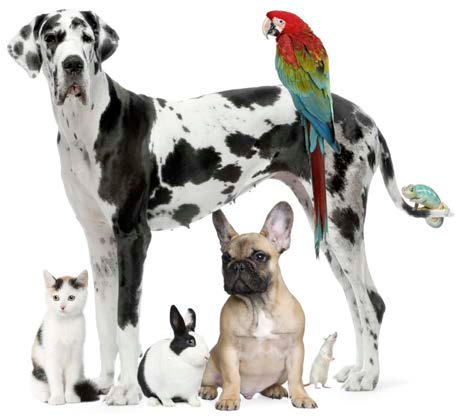Dealing with Grief from the Loss of Your Pet
LPM-00149 View this publication in PDF form to print or download.
by Marla Lowder

 More and more, pets are becoming members of our families, our companions or our best
friends. So it is understandable to most that when our beloved passes on there is
an intense sense of loss. Following are some tips that can help you transition through
the process of grieving for your pet.
More and more, pets are becoming members of our families, our companions or our best
friends. So it is understandable to most that when our beloved passes on there is
an intense sense of loss. Following are some tips that can help you transition through
the process of grieving for your pet.
Why Does It Hurt So Much?
Most people feel a deep loss when a family member passes on, so why shouldn’t it be the same when your furry family member is gone? Your pet became a significant part of your life, whether it was with you for a short while or many years. It was a source of comfort and companionship, full of unconditional love and acceptance. Your pet brought you lots of joy and many hours of fun. It is understandable if you are devastated when it is gone.
Some people may never understand why you feel the way you do. Don’t let them tell you how you should feel. You are the one who had the bond and lost the loved one. People who have experienced this loss will have empathy for you. Let them help you through the grieving process, but keep in mind that each of us goes through the process differently and at our own pace.
Stages of Grief
As you go through the following stages remember that this is your time and you will go through these stages differently than others will. You may spend more time on one stage and hardly any on another. Elisabeth Kubler-Ross’s five states of grief are what most people feel, and most people go through them in the following order:
- SHOCK AND DENIAL. When a death occurs none of us want to believe it is true, or we are stunned and bewildered.
- ANGER. This is where we lash out at anyone from family to a Higher Power and anyone in between. We are experiencing feelings of guilt and fear, which intensify during this stage.
- BARGAINING. We may ask a Higher Power to save our beloved in exchange for improving our own behavior.
- DEPRESSION. A person at this stage will feel intensely sad, hopeless, drained and helpless. We can’t seem to quit thinking about our pet.
- ACCEPTANCE. This comes when the changes brought upon you by your loss are stabilized into a new lifestyle.
How Do You Handle Your Feelings?
Remember, you need to be honest with yourself. Don’t suppress your feelings of pain, anger or guilt. Only by examining and coming to terms with your feelings can you begin to work through them.
It’s okay to feel pain, grief, anger and guilt. You have just lost something dear to your heart and it has left a void there.
Hiding your grief doesn’t make it disappear. You need to cry, scream, pound the floor and talk it out. Do whatever it is that helps you out. You can’t hide from your feelings; hiding will just prolong the grief and make the process harder on you. You need to reminisce about the good times to help ease the loss.
Some find it helpful to write about their pets in poems, stories or a letter to the pet. Consider reading Harley King’s It’s Okay to Cry. King gives 14 points on writing your grief out. You can also find many other sites about dealing with grief on the web.
Other helpful ideas may include preparing a memorial, filling in your schedule with other activities to do when you would have been with your pet and — probably most important — talking to others about your loss.
Are There Really People Who Will Listen?
Pet-owning family members and friends will understand your loss. Too many people try to hide their feelings to appear strong. You need to work through your feelings, and one of the best ways to do that is to talk with another person. This will help you put your feelings into perspective. Find someone you can talk to and with whom you feel comfortable crying. Share your feelings of how much your pet meant to you and how much the loss hurts.
If you don’t have someone who will understand you, ask your veterinarian, the humane society, your church or the animal hospital to recommend a pet loss counselor or support group for you. Remember, your grief is genuine and deserving of support.
There are also support groups on the Internet that you can turn to. This can help you if you have a hard time opening up to someone you know or in person.
Be Aware of Your Children
If you have children, you need to be the judge of how much information they can handle. Be careful not to underestimate them. By being honest about the loss of your pet, you may be able to address some fears and misperceptions they have about death.
Be careful choosing your words when telling your children. If you tell them that the pet was put to sleep, make sure they understand the difference between death and ordinary sleep. Otherwise, they may believe that if they or someone they love goes to sleep they will not wake up.
 If you tell your children that the pet went away, they may have thoughts that the
pet will return, which may prevent them from accepting a new pet. It could also make
them wonder what they did wrong that made the pet leave. Remember, however old your
children are they need the chance to grieve. Never criticize children for tears or
tell them to be strong or not to feel sad. You need to share your feelings with them
and let them share theirs with you. If you have a family, discuss the issue with them
and give everyone a chance to work through their grief at their own pace.
If you tell your children that the pet went away, they may have thoughts that the
pet will return, which may prevent them from accepting a new pet. It could also make
them wonder what they did wrong that made the pet leave. Remember, however old your
children are they need the chance to grieve. Never criticize children for tears or
tell them to be strong or not to feel sad. You need to share your feelings with them
and let them share theirs with you. If you have a family, discuss the issue with them
and give everyone a chance to work through their grief at their own pace.
Don’t Forget That Your Other Pets Will Probably Grieve
Whether your pets got along or not they will notice that the other is missing. Most pets in the house have a strong bond and will grieve for the loss of their companion.
Your surviving pet may need a lot of extra attention and love to help it through its grieving period. Also, if you are going to introduce a new pet, your surviving pet may not accept the newcomer right away. In time, though, new bonds will grow. And as you help your surviving pet to grieve, remember that its love can be wonderfully healing for your own grief.
Do I Get a New Pet Right Away?
Most people are not ready for a new pet right away. You need to work through your grief and loss before you can build a new relationship with a new pet. If you are still grieving, a new pet may make you resent it as you feel it is trying to take the place of your lost loved one. You may feel that you are being disloyal to your old friend. Children especially may have these types of feelings.
When you are ready to get a new pet, you may want to avoid getting one that looks like your other pet. You may find yourself comparing them and expecting them to be just alike. Remember that they are different and will have their own qualities that you will come to love. As you are getting used to the new pet, never compare it to your old pet — don’t forget that your beloved companion also caused a few problems when it was young.
A new pet should be brought in when you are ready to build a new relationship instead of looking backward and mourning your loss. When you are ready, select an animal with whom you can build another long and loving relationship — because this is why we have pets!
Side Notes
Euthanasia is a hard decision, but there often comes a point when something must be done. Your veterinarian is the best judge of your pet’s physical condition; however, you are the best judge of the quality of your pet’s daily life. If a pet has a good appetite, responds to attention, seeks its owner’s company and participates in play or family life this may not be the time. However, if a pet is in constant pain, undergoing difficult and stressful treatments without improvement, unresponsive to affection, unaware of its surroundings and uninterested in life, you may choose to end your beloved companion’s suffering.
Evaluate your pet’s health honestly and unselfishly with your veterinarian. Prolonging a pet’s suffering in order to prevent your own ultimately helps neither of you. Nothing can make this decision an easy or painless one, but it is truly the final act of love that you can make for your pet.
Dealing with the remains of your pet differs from state to state. In Alaska, refer to the UAF Cooperative Extension Service publication “After Your Pet Dies,” LPM-00148.
Marla Lowder, Extension Faculty, 4-H and Youth Development
Revised June 2017
